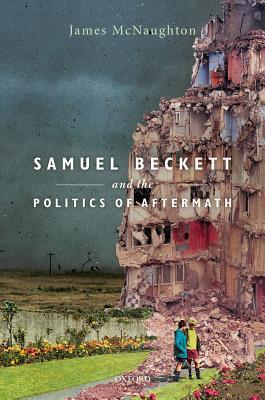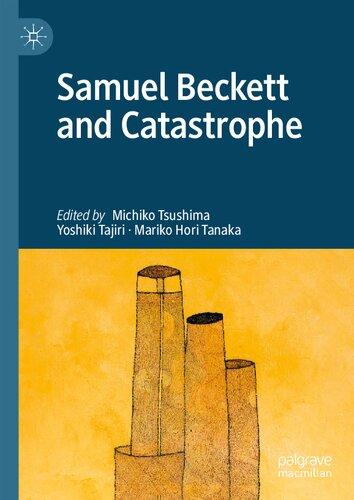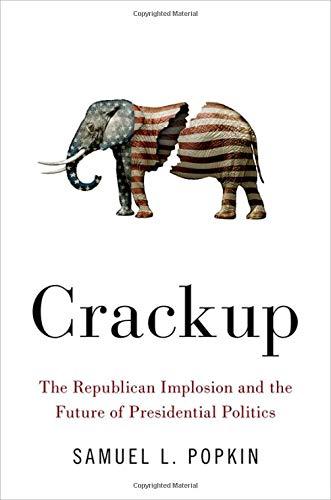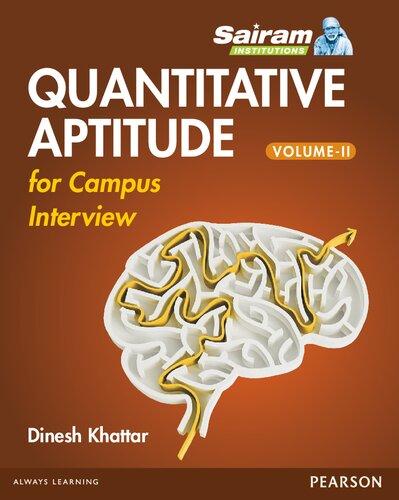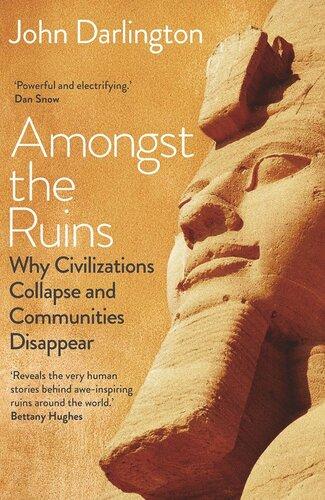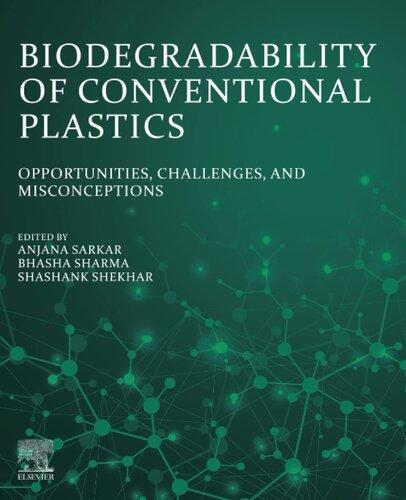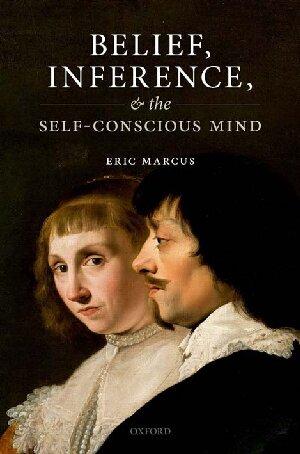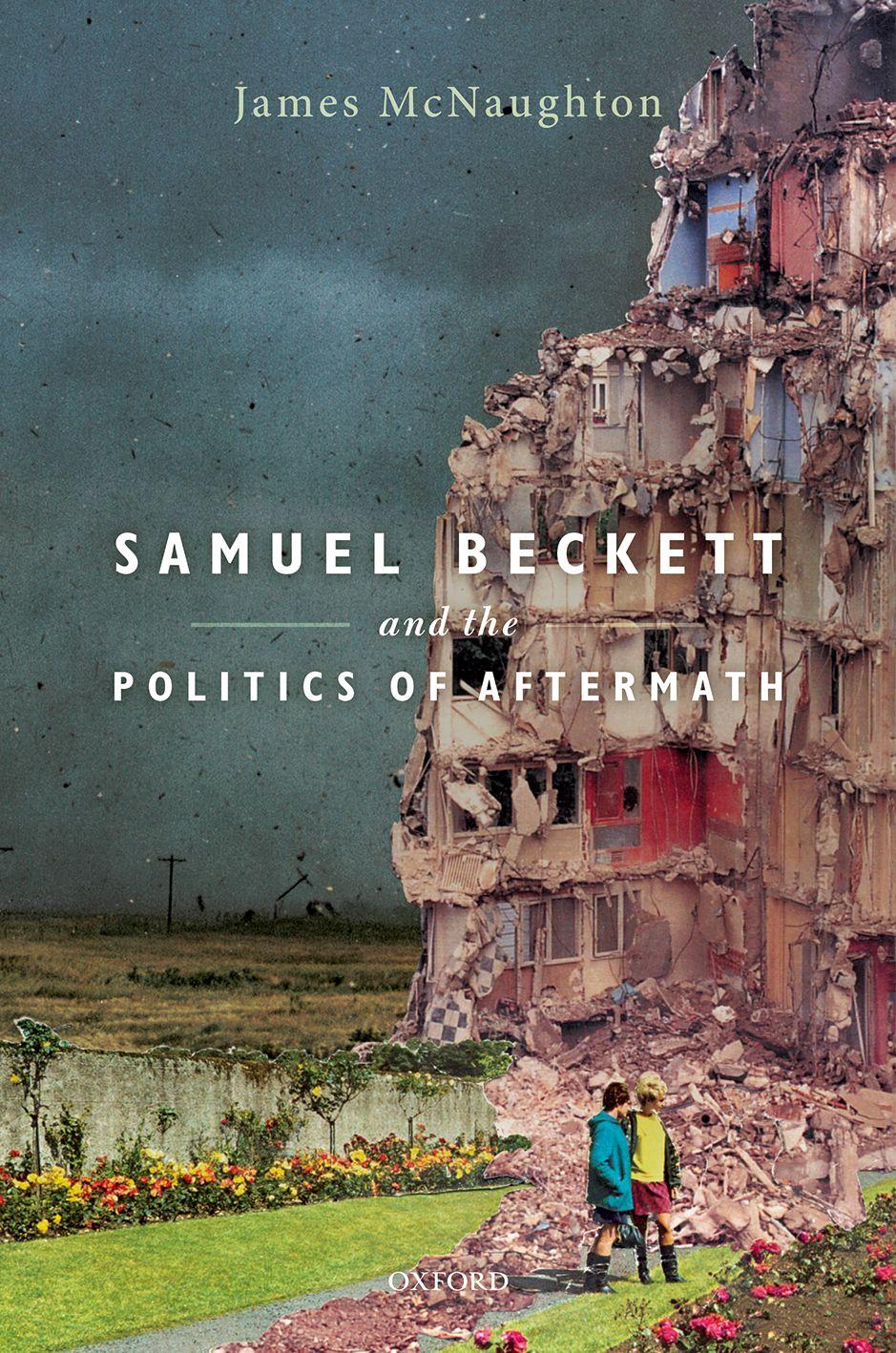Acknowledgments
Many people encouraged me in writing this book during its long genesis and completion. I’m most grateful to Adam Parkes, who has offered warm friendship and astute, light-handed professional advice at decisive moments of application: to graduate school, to assistant professor jobs, for tenure, and in applying myself to this book and this book to a publisher. Seán Kennedy has generously encouraged my work over the last decade and published it in collections he deftly edited. Both he and Adam have joined other friends and colleagues who have read individual chapters: Neil Doshi, Alex Cook, Duncan Yoon, and David Deutsch. I appreciate Bill Ulmer’s steady encouragement and practical guidance. I’m grateful to my other English department colleagues, to my former chair Catherine Davies, and current department chair Joel Brouwer.
Thanks to Edward Beckett for attending to my work and to the Beckett Estate for permission to quote from Beckett’s Notes on Philosophy, German Diaries, German Vocabulary Notebooks, letters, and other unpublished drafts and versions of Beckett’s work. Thanks to Bloodaxe Books for permission to quote from Tomas Tranströmer, New Collected Poems, trans. Robin Fulton (Hexham: Bloodaxe Books, 2011). Chapter 1 was previously published in Seán Kennedy (ed.), Beckett and Ireland: New Perspectives (Cambridge: Cambridge University Press, 2010), reprinted with permission. Chapter 2 first appeared in Modern Fiction Studies, Volume 60, Issue 2 (Summer 2014), 320–44. Copyright © 2014 The Johns Hopkins University Press. Chapter 3 was previously published in Seán Kennedy and Katherine Weiss (eds.), Samuel Beckett: History, Memory, Archive (New York: Palgrave Macmillan, 2009), reproduced with permission of Palgrave Macmillan.
The archival research was facilitated by librarians at Trinity College Dublin, the Reading Foundation, and the Harry Ransom Center, and I’m grateful to all of them, especially Elizabeth Garver in Austin. My colleague from the History department, Margaret Peacock, counseled me on histories of Ukraine. At Oxford University Press, Jacqueline Norton and Aimee Wright have been terrific to work with, and the two anonymous readers of the manuscript suggested sharp improvements and expressed appreciation that lifted me to the end. Without the support of the University of Alabama—sabbatical leave, two University of Alabama Research Grants, and unfailing interlibrary loan and library services (looking at you, Brock Tyra)—I would not have completed this book. The Beckett community is collegial and supportive. Thanks to David Lloyd and Andrew Gibson for encouraging me with this project; thanks to Mark Nixon for confirming my transcription of certain patches in Beckett’s piebald handwriting; and thanks to other Beckett scholars for illuminating the path: Patrick Bixby, José Francisco Fernández, Jim Knowlson, Nadia Louar, Emilie Morin, John Pilling, Mark Quigley, and David Suchoff, among others. I have presented this work at Beckett conferences as well as conferences for
Acknowledgments
the Modernist Studies Association, the International Association for the Study of Irish Literatures, and the American Comparative Literature Association. For all the tips, leads, and suggestions from other participants, my thanks.
Thanks to Nicholas Allen at the Wilson Center for the Humanities and Arts, and to Susan Rosenbaum, Adam Parkes, and the other engaging members of the Interdisciplinary Modernist Group at the University of Georgia for inviting me to Athens to present Chapter 6. I spent writing time in the Boston Public Library and, thanks to Carol Morini, at the Boston Athenaeum. My archival work on Beckett’s manuscripts began long ago in graduate school: thanks to the financial support from the Rackham Graduate School at the University of Michigan. Though the work here is different from my work then, the intuitions that guide this project also emerged and were cultivated at Michigan. Enoch Brater directed my dissertation, and I found myself lucky to be taught by David Porter, Martha Vicinus, Simon Gikandi, and John Whittier-Ferguson: master teachers, among many there, who modeled a life of expansive intellectual inquiry while cultivating careful reading, historical precision, and fine attention to the sentence. I owe thanks to the students who took my Beckett courses, and in particular to the first-year research assistants assigned hours with me, Wyatt McMurray and David Kumler especially. I’ll miss my father lightly asking about the mystery of this book’s progress, now that it’s out. I dedicate this book to Mary and to Niamh: they nourish every day together with unstinting vitality and love.
In a letter to Barbara Bray, Beckett comments on the name “Naughton”: “(wonderful name for a character, why did I never think of it).” We can guess the appeal: the name bounds nothing and something, like the skin of a bubble. In this spirit, my final gratitude to all those friends and colleagues I have not mentioned here by name, all those who heard “naught on” and “not on” and graciously replied “aught to.”
Introduction: “Reduced to doing a lap with Führer”: Beckett’s Political Aesthetic 1
1. “The same old mouldy words”: Beckett, Modernism, and the Irish Free State 25
2. “Echo’s Bones”: Sex, Politics, and Entailment in the Irish Free State 43
3. Beckett in History: German Diaries, Watt, and the Problem of Propaganda
4. Taking Them at their Word: Politics of the Body in Malone Dies 79
5. “It all boils down to a question of words”: The Unnamable and History’s Abattoirs
6. “Prophetic Relish”: Famine Politics in Beckett’s Endgame
Introduction
“Reduced to doing a lap with Führer”
Beckett’s Political Aesthetic
“Buy Führer,”1 “get a Führer (90pf.),”2 “[b]uy Führer and postcards”:3 when he toured Nazi Germany from October 1936 to April 1937, like many visitors, Samuel Beckett relied on guidebooks. These Führer steered him to churches and monuments, through streets and galleries, where Beckett would bump into other Führer as well: “polite German Führer”;4 “accosted by seedy gent . . . [who t]urns out to be a Führer”;5 “reduced to doing a lap with Führer.”6 Tour guides, pestering or polite, hold Beckett’s attention, greedy as he was to hear and speak German. Beckett devoted this trip to viewing paintings, to cultural and linguistic saturation, so none of this is surprising. Nor should we be surprised that the other Führer looms ever larger, in shadowy and unsilent distance: paintings, books, permissions to exhibit, “banned by Führer”;7 on the loudspeakers and radio broadcasts, “[i]nterminable harangue from Führer”;8 and the leader cult, those star-eyed tales from those who have seen him.9 The one Führer, academic guide and aesthetic aide; the other, interminable and censorious, profoundly threatening to everything to which Beckett devotes himself. These Führer will jar. Eventually, Beckett finds it hard to find a decent guidebook or German history without Nazi influence:
No guide but Woerl, which they press upon me in vain. At last grudgingly produce a work by Prof. Knapp. It seems more like it. And when I hear that the book is reduced from 3.50—2 RM [Reichsmark], + that the author is in “retirement” I know I am on the right thing.10
In Germany, politics cannot be kept at bay, and Beckett records one “Führer” eclipsing and literally retiring the other.
“Führer” and “Führer” is a conspicuous opening to a book that aims to illustrate how Beckett’s early and middle writing systematically builds out from the ironic consummation of aesthetics and politics. The spark in this example is not just a witty juxtaposition, not me striking hard aesthetic flint against harder political steel. Beckett’s diaries, notebooks, and letters make a point of firing off singlebarreled puns, words which explode forward with personal or aesthetic meanings in propulsive proportion to their recoil against contemporary political history. Minor examples are telling: Beckett abbreviates a favorite restaurant [Stadtshänke] as the SS, 11 in a notebook he quips his trip as the “Bierjarhesplan” [beer year plan] after the Nazi “Vierjarhesplan” [Four-Year Plan], setting his own designs for heavy sousing against Nazi colonial food plans that Beckett astutely expected would lead
to war.12 When, in the middle of his tour, Beckett writes to Günter Albrecht that it has been lonely since he left Hamburg, “but in such a pleasant manner that it hasn’t even occurred to me to look for any so-called ‘Anschluss [connection],’ ”13 Beckett opposes his solitude to the Nazi term deployed to advocate for the annexation of Austria. Maybe these appropriations of Nazi watchwords for his own dispositions and boozing could be written off as mock-heroic self-preservation, daft defiance that separates personal and aesthetic experience from growing political meddling, the jokes that help one to adapt to fearful policies beyond one’s control. But to read political humor as disregard can miss how profoundly Beckett’s diaries, formally as well as in content, position themselves against the German histories and Nazi propaganda that disgusted and terrified him, miss too how sardonically Beckett entwines his own subjectivity and writing with the political world that limits and shapes them.
More troubling, if we miss it here in personal writing when confronting Nazi Germany’s consolidation of power, then how much harder it is to account for Beckett’s creative work which also writes from the provocative disjunctions of aesthetics and politics. Consistently and seriously, the double bind of Führer and Führer, if I can be allowed this shorthand, reappears as an obsessive principle of composition. In Malone Dies, Malone describes his aesthetic aims with categories that pun terms for atrocity, historical and political meanings he attempts to repress and contain: catastrophe, elimination, and annihilation. Beckett’s narrators discuss killing characters as if they are real murders, not aesthetic decisions, animating works with interpretative confusions that reflect how political justifications for murder have also become aesthetic in reality. Elsewhere in Beckett’s work, techniques of fiction, stage direction, and performance model political power that aspires to aesthetic effect. In the later play What Where, for instance, the piped-in voice commands characters with the American colloquialism for administering torture— “give him the works until he confesses”—but even here “the works” retains its aesthetic meaning, a confusion that calls to mind how torture in Beckett’s lifetime was often in the business of confirming and verifying political fictions.14 In striking moments across Beckett’s work, scales of interpretation suddenly switch to reveal rhetoric’s implication: words or concepts employed with aesthetic, philosophical, or colloquial meanings suddenly suggest overwhelming political and historical power that impinges on bodies and lives. It might appear shocking, or overly simplistic, to argue that Führer and Führer is the analytical center from which Beckett writes for the first decades of his career. But given that the only book-length study devoted to Beckett’s tour of Nazi Germany concludes that Beckett returns from the trip devoted to an “authentic inscription of the self and an unflinching inquiry into the human condition,” and that Beckett seeks to avoid the “expression of emotion encumbered by outside forces,” perhaps the sting of simplicity is due.15 The undialectical assumption that Beckett aspires to write without encumbrance from history and politics can be so pervasive in studies of Beckett’s work and life, in fact, that it silently colonizes the possibility of other interpretations from the outset: the English translator of the German letter above,
for example, removes Beckett’s quotes from “ ‘Anschluss’ ” to merely give us the English “connection,” dispensing with Beckett’s self-posturing against “outside forces” on our behalf.16 We make more than a translation decision when we elide such political history. We suggest that specific history that has impinged on language, on subjectivity, and on aesthetic forms—more, that will violently upend the world—can be circumvented by aesthetic and personal decisions, an existential clarity that Beckett’s creative work thoroughly rejects, even as it often examines the seduction of such erasure.
This book approaches the task of interpretation differently. My work presents a writer who is politically alert in specific historical moments and who addresses the failed political, aesthetic, and philosophical solutions to modernity with surprising sensitivity to the limitations of interpreting from one perspective alone. What I argue and illustrate persistently is that Beckett’s writing suddenly confronts interpretations invested in aesthetic effect and philosophical meaning with political and historical problems that vie with or contest such interpretations. By politics, I initially mean Beckett’s direct encounter with contemporary politics. I orient the book, then, with chapters on the specific political developments from which Beckett’s writing emerges and to which it responds: the realization of Free-State Ireland, the rise of Nazi Germany, and the consequences of the war. Both Ireland and Germany mark out Beckett’s immediate and initial political experience in the decades this book treats, and archived biographical records detail Beckett’s responses. Though I treat Beckett’s responses to different political situations in themselves, Beckett restlessly mediates his own cross-border experience, aware of how aesthetic and political ideas transform when relocated from one place to another. This has been harder to recognize when the history, politics, and aesthetic traditions of Ireland and continental Europe are kept distinct, just as the so-called Irish Beckett and European Beckett often are. I arrive at new readings by accessing some of Beckett’s voluminous manuscript writing, some of which, excitingly, has begun to be published: early drafts, rejected fiction, and translation manuscripts (Harry Ransom Center, Austin); letters to Thomas MacGreevy, and Beckett’s notes on philosophy (Trinity College Dublin); and vocabulary notebooks and diaries that record his half-year trip through Nazi Germany (Reading, England).
But biography is not my principal focus. Andrew Gibson, after Jim Knowlson, has written a terse and perceptive critical biography that positions Beckett in political history.17 And Mark Nixon and Dirk Van Hulle’s work—and that of others, as well—usefully catalogues details from Beckett’s enormous archives, often from a biographical perspective.18 Most recently, Emily Morin crowns this approach in her book Beckett’s Political Imagination (2017), which “reinscribe[s] Beckett’s career into its political milieu.”19 What is now needed, and what I hope to provide here, is a detailed materialist and historicist examination of Beckett’s formal responses to and engagement with this political context in his creative work. Newer groupings of scholars have started to grapple with this growing scholarly need. Seán Kennedy’s edited collections Samuel Beckett: History, Memory, Archive (2009) and Beckett and Ireland (2010) are forerunners in such scholarship, and parts of the early chapters
Samuel Beckett and the Politics of Aftermath
in this book first appeared in these collections. I should not, then, overstate the separation of Führer from Führer in Beckett criticism. Nevertheless, the broader historical turn in modernist scholarship—underway at least since Michael North’s The Political Aesthetic of Yeats, Eliot, and Pound (1991), and further back if we remember other strands of criticism20—has taken longer to reach Beckett’s work, which yields only grudgingly to such approaches. When Richard Ellmann calls Beckett the “Nayman from Noland,”21 he captures the familiar deterritorialization of writer and work: in the phrase we hear the critical slant that finds Beckett’s writing above the historical and political fray—existentialist, absurdist, or, later, posthumanist in its skeptical disavowal of standing notions of subjectivity, authorship, and linguistic certainty. North’s Political Aesthetic, sensitive to historical context and to the relationship between aesthetics and politics, is a particularly lucid exemplar of criticism that unravels the cliché that modernist writing remained aloof from the effects of war, from political concerns, and from history. This reexamination supplants modernism’s supposed apoliticism with conceptions of modernism as an ideology of fascism, modernism that foolishly, if ambitiously, attempts to resolve aesthetically what are economic and political problems. Eliot’s traditionalism, Pound’s Fascism, and Yeats’s sometime support of authoritarianism: these all derive from misguided attempts to reconcile relationships “of individual to the community, of literature to practical action, [and] of the individual parts of an art work to its overall structure”—reconciliation which, as Michael North argues, many of their writings at first productively resisted.22
Beckett has been mostly absent from this reappraisal, perhaps because he bristled against Yeats, Eliot, and Pound and their political leanings long before he joined the French Resistance, or perhaps because his work provides strategies for avoiding political readings even as it formally puts such resistance under examination. But there is good reason to include him, not least since contemporary scholarship has again shattered interpretations of modernism as a monolithic artistic ideology of fascism, recognizing instead an artistic movement more plural and dialectical. Simon Gikandi, as guest editor of a special edition of Modernism/ modernity, can argue that modernist practitioners “were [also] at the forefront of the international struggle against colonialism and racism,”23 and that “without modernism, postcolonial literature as we know it would perhaps not exist.”24 Part of that maturing owes to Irish studies, and more particularly to studies on Joyce’s writing, which provokes stiff attention to Ireland’s specific semicolonial history and the politics of language and aesthetic form, aspects of Joyce’s work that Beckett’s own writing recognizes long before criticism catches up.25 These studies, along with the slow explosion of Beckett’s archival work into print, have begun a major transformation in Beckett scholarship as well.26 This book is indebted to approaches to Beckett that derive from Irish studies and postcolonial criticism,27 and to more recent essays that begin to grapple with Beckett’s political aesthetics.28 In extending this work, I aim to transform how we understand Beckett’s early to middle corpus, as well as to intervene in critical debates about modernism and various approaches to literature and historiography. This book should appeal to readers of Beckett’s work, then, but perhaps also to modernist scholars and readers
who seek a clearer conception of the ways literary interpretation—analysis of formal refinements, historical allusions, archival manifestations—critically models and engages specific political and historical antagonisms. Beckett’s writing repeatedly both exposes the limits of modernism’s political aspirations and transforms the terms by which we might understand political modernity.
The first part of this claim is easier to identify: though a modernist, Beckett is nevertheless an idiosyncratic latecomer whose work actively engages early debates about the politics of modernism. In Beckett’s personal and critical writing this engagement appears in contradictory stances, typical of so many modernists. He signs a manifesto heralding experimental writing as a propulsive historical force; he also champions modernism as self-justifying and autonomous, wisely elusive of political agendas; and sometimes he retreats to merely upholding modernism’s personal aesthetic value, akin to prayer.29 Beckett’s creative work, however, brings under ironic scrutiny uncritical advocacy of commonplace understandings: that modernism’s formalist innovations underwrite ahistorical aspirations, a detached and noncommitted ethos, a complete severing from social reality (think of Maurice Beebe, drawing on New Critics before him, confidently defining “the closed worlds of Modernist art”30); that modernism unwittingly colludes with bourgeois systems of power and, ultimately, with fascism (remember Georg Lukács initiating two other early commonplaces of modernist criticism: first, that experimental presentations of subjective disorder erode the capacity to objectively critique modern bourgeois distortions; and, second, that modernist works’ formal rigor somehow aligns with authoritarian discipline and order, an argument picked up by later critics as diverse as Frank Kermode, Fredric Jameson, and, with most sophistication, by Michael North31); and, finally, that modernism’s representational unorthodoxy instead operates as a subversive, even liberating historical force (recall Adorno championing modernism that defamiliarizes the smooth surface of bourgeois modernity through a “negative mimesis” that reveals its darker underpinnings). Of these, Adorno’s account is the most incisive for understanding Beckett’s work.
But what makes Beckett harder to classify is that while his work is undoubtedly experimental in form, it actively, often comically, performs these contradictory critical interpretations, compelling us to their limitations. How many of Beckett’s works pose as “closed worlds,” for instance, only to posit closure itself as a disgraced mode of coping with unbearable historical calamity ushered in by fascism and war? (Watt can be understood this way.) The narrator of Malone Dies tries to write autonomously in order to effect an escapist move from history, to give the appearance of moral innocence and neutrality. But Beckett has him fail. More damningly still, for Beckett autonomy is a place of cruelty and exploitation— where killing characters is treated as necessary murder, say, where the act of writing is imagined as torture and elimination. This confuses art’s law unto itself with the reader’s uneasy recognition that this same outside-of-the law—what Giorgio Agamben will call the “state of exception”32—has applied beyond fictional spaces, in history, too. Even Beckett’s early antiheroes appear something like comical Lukácsian parables about modernism: they pursue freedom as radical indifference,
political noncommitment, and psychological self-obliteration coded in aesthetic terms—Murphy’s pursuit of mental “chaos.” But the outer world takes its revenge. Near the book’s end, Murphy is killed in a violent, objective manifestation of “chaos,” the Greek etymology of gas. The narrative ironically retranslates Murphy’s term, objectively refiguring it as external physical destruction. Whatever else its target, and the moment is wholly overdetermined, Beckett satirizes Murphy’s aesthetically coded stances as ineffective, even complicit with an external world that threatens to apply such solutions by the letter. In early chapters, my use of the term “modernism,” though precise from usage to usage, shifts somewhat opportunistically with the critical approaches that Beckett reworks; but, to be clear, I understand Beckett’s modernism as precisely this restless pitting of one interpretation against the other in the service of evaluating modernism’s contradictions, including Beckett’s own, of delimiting modernism’s presumed effects, and, more importantly for this book, in the service of modeling aspects of historical power.
ADORNO: PUTTING MEANING ON TRIAL
Even Theodor Adorno’s general terms for understanding modernism, the most astute of those mentioned above, already seem to be performed in Beckett’s writing—an overlap made less surprising given Beckett’s profound influence on Adorno’s theories of modernism. Consider Adorno’s central and penetrating claim that “[t]he basic levels of experience that motivate art are related to those of the objective world from which they recoil. The unsolved antagonisms of reality return in artworks as immanent problems of form. This, not the insertion of objective elements, defines the relation of art to society.”33 Understood sociologically (“the relation of art to society”), the autonomy of modernist artworks for Adorno is measured by their formal resistance to capitalist commodification: no one, to put it too neatly, has spun The Unnamable into film.34 Understood aesthetically, which is the approach that primarily interests me here, Adorno’s position would have us identify and explain “problems of form” that make visible the “unsolved antagonisms of reality.” Without such “problems,” “[f]ormal structures which challenge the lying positivism of meaning can easily slide into . . . vacuity” or “degenerate insensibly into mere hobbies, into idle repetition of formulas . . . into trivial patterns.”35 Put differently: “If art cedes its autonomy, it delivers itself over to the machinations of the status quo; if art remains strictly for-itself, it nonetheless submits to integration as one harmless domain among others.”36 In this view, modernist works cannot quite escape the paradox that the method by which they resist the fungibility of commodity culture is through their uselessness, nor the related paradox that autonomous art itself is guilty of the fetishism that it critiques. (This hypocrisy has been reformulated in New Modernist Studies to damn the viability of notions of artistic autonomy altogether, since many modernists were, unsurprisingly, savvy self-promoters of their collectors’ editions, or sharp-eyed with copyright, or shrewd at marketing their works as anti-market.37) Despite acknowledging
similar paradoxes, Adorno’s definition, then, has modernist works as both autonomous and not-autonomous, negatively revealing in their form aspects of the world from which they have distanced themselves.
The opening Führer and Führer shows Beckett crystallizing these relations in his own precise terms; but an example from a familiar moment in Molloy helps me further elaborate Adorno’s thinking, how Beckett anticipates and diverges from it. When the policeman demands from the title character “Your papers!,” Molloy responds:
Now the only papers I carry with me are bits of newspaper, to wipe myself, you understand, when I have a stool. Oh I don’t say I wipe myself every time I have a stool, no, but I like to be in a position to do so, if I have to. Nothing strange about that, it seems to me. In a panic I took this paper from my pocket and thrust it under his nose. The weather was fine.38
The funny switch from legal paper to toilet paper makes a parable of what Adorno articulates: Molloy’s experience and interpretation of “papers” resist worldly meanings of identity, either from the law or even George Orwell’s name for an actual tramp’s stash;39 instead, his papers are for wiping after defecation, the body’s papers. Beckett takes the effect further when he uses the cliché the policeman might know from detective fiction and places these papers literally “under his nose.” For Molloy, even arrest is experienced and recorded aesthetically rather than legally: “the weather was fine.” Molloy is a bit like Adorno’s modernist art itself, blithely resistant to the worldly logic, clichés, and genres that he is in contact with; obliviousness is a form of autonomy, a law unto itself, as the etymology has it, ever in satirical dialectic with generic and institutional meanings. The form—here puns and reworked clichés—comically suggests that modernism can snub the world of meaning, even unintentionally, and that the snub can also reveal “antagonisms of reality”: in this case, that the agents of law charged with protecting private property or keeping public peace are also centrally interested in policing bodies, or, to expose the pun on Molloy’s concern, managing movements. Autonomous and not-autonomous, Führer and Führer, the ironic collision of aesthetic and real-world meanings: perhaps Adorno’s theoretical language and difficult presentation flatten the precise close readings of history and form readers now expect and to which this book aspires. Nevertheless, Adorno’s arguments deserve a few more pages because Adorno is the first critic to hone the eerie physical literalism in Beckett’s depictions of postwar degradation. He reads this corporeality as undermining philosophical interpretations, existentialist ones in particular, keen on resurrecting the subjective meaningfulness that Adorno finds Beckett’s work flatly refuses.
In his famous essay “Trying to Understand Endgame” (first published in Noten zur Literatur II, 1961, and translated into English in 1982), Adorno comes closest to examining how the collision of contradictory interpretations confront specific interpretations with representations that bring to mind recent political history. “Trying” in Adorno’s title should not be understood as an admission of humility so much as Adorno’s important discovery that Beckett’s work invites philosophical interpretations, only to call them to account for obscuring the horror of our
historical moment. 40 It is worth our returning to this essay, and not because existentialist ontology still merits serious refutation. Despite renewed recent interest in existentialism, 41 and despite its persistence in Beckett criticism, 42 its ontology is generally understood to be firmly located, as the Stanford Encyclopedia of Philosophy puts it, within “intellectual history,” “a cultural movement . . . belonging to the past.”43 That said, many critics, either invested in preserving Beckett as a commonsense humanist or still attached to existentialist readings that Adorno dismantles, too quickly dismiss Adorno’s interpretations outright rather than engage their limitations.44
Existentialist readings of Beckett’s work were never fully eclipsed by Adorno’s posthumanism nor by later poststructuralist theories: they persist. To many, the landlord tyrant and existential mouthpiece of Waiting for Godot can still be understood as the play’s messenger: “They give birth astride of a grave, the light gleams an instant, then it’s night once more.”45 So opines Pozzo, the lyrical lord, a convenient philosophy of “being-in-time” still sometimes attributed to “all” of Beckett’s work,46 a philosophy that occludes the fact that certain groups live and die in radically different conditions. In this mode, for instance, Leo Bersani and Ulysse Dutoit argue that Beckett’s play Endgame is an existential drama, an aesthetic literalization of “premises about the structure of being in time,”47 the normally “veiled structures” of “time-as-death.”48 The audience experiences, they argue, uncanny moments of metaphysical truth when what is staged, even though not representative of the objective world but instead drawing on philosophical premises, feels empirically and recognizably familiar. For example, the audience is made to recognize that the beginning of the play encodes its ending (“[i]t is finished” are the opening words), just as “[t]emporality unsupported by teleology [is or produces] the death immanent in every birth.”49 Such interpretation leads to illustrative conclusions: “[i]f being born is a death sentence, then to give birth is a murderous act: thus Hamm’s wholly logical treatment of his assassin parents as human garbage.”50 The theatrical performance of this existentialist premise finds it “wholly logical” to understand procreation as murder, and the just and fitting punishment of progenitors as starving or suffocating them in bins. This conclusion, drawn from ideas theatricalized, appears unsettlingly grotesque, however, once we allow that the play contradicts this concluding logic with awareness of recent political history’s horrors and, more simply, the visceral presence of actors on stage. Parents treated as trash materializes eugenic rhetoric from postwar France, present already in Lucky’s rant in En attendant Godot, and made incarnate here. Lucky’s reference to “l’élimination des déchets,”51 as Andrew Gibson has argued, refers to tossing “social trash as well as physical waste matter.”52 Aesthetic presentation intersects common usage to undermine the philosophy it nevertheless evokes. Something sinister is at work, I want to say, when the invitation to accept an existentialist interpretation requires we deem “wholly logical” what, held up slightly differently, evokes contemporary historical barbarity as well as the political rhetoric that promotes it.
With different examples, Adorno anticipates this critique decades in advance: for him, Beckett’s Endgame undermines hypostasizing and ahistorical philosophical abstractions by making literal and physical the aftereffects of calamity on stage.
Against existentialism’s “absurdity,” for instance, Adorno argues that Beckett’s bare-bones staging of the “stratum of utensils as in an emergency refuge: iceboxes, lameness, blindness, and unappetizing bodily functions,” are “pathetic details which ridicule conceptuality,” are “not symbolic but rather the post-psychological state, as in old people and torture victims.”53 Beckett’s anti-symbolic literalisms ridicule existentialism twice over. First, they confront existentialism’s universalized ontological categories—absurdity or homelessness, say—with the charge that that these categories threaten to become jargon once removed from historical particularity. “Shelteredness,” for instance, understood only as a state of mind available to all men, Adorno indignantly points out in Jargon of Authenticity, obscures the obvious fact that shelter is the costly structure you may or may not be able to afford.54 “Such universal humanity, however, is ideology. [I]t hides from men the unalleviated discriminations of societal power.”55 Second, Beckett’s presentation of the subject undercuts existentialism’s solution to the “absurdity” of existence—“the universal and the immutable”56 human subject, absolute, a wellspring of meaning in a world shorn of metaphysics: existentialism, “that creed of the permanence of individual existence.”57 Adorno mistrusts this rehabilitation of the subject because it makes the human subject autonomous without sufficient regard to the historical conditions that limit this possibility: the “formal gesture of autonomy replaces the content of autonomy.”58 Those historical limits are postwar capitalism, whose “process of alienation” Adorno accuses existentialism of eliding.59
The more poignant limit, however, is the simple fact that state power in the 1930s and 1940s modeled a world that stripped agency and autonomy from millions of civilians who were subsequently starved or gassed to death. To then argue that human freedom and autonomy are accessible through commitment, as existentialism often does, makes light of historical forces that can strip that freedom absolutely. The argument for commitment comes across as either half-baked or akin to complicity. It valorizes marching to one’s own tune, at the risk of overlooking, to borrow Beckett’s old joke, what one is stepping in. Adorno’s Jargon of Authenticity makes clear that Heidegger’s Nazism is not simply a mistake, then, but an alignment his ontology makes possible.60 Beckett’s Endgame is Adorno’s corrective:
The catastrophies [sic] that inspire Endgame have exploded the individual whose substantiality and absoluteness was the common element between Kierkegaard, Jaspers, and the Sartrian version of existentialism. Even to the concentration camp victims, existentialism had attributed the freedom either inwardly to accept or reject the inflicted martyrdom. Endgame destroys such illusions.61
If murderous history pushed autonomous individuality off the wall, Adorno’s Beckett will not allow these king’s men to put it back together again. Existentialist ontology argues that the unified subject can transcend circumstance; in Adorno’s damning indictment this means the farce of naming as freedom the purported ability to choose a mental state in the concentration camp. Endgame, which excludes history or reduces it to “permanent catastrophe,”62 by doing so nevertheless reflects a historical crisis in which the subject has lost “the power of consciousness to think
Beckett and the Politics of Aftermath history” and whose historical salvation is unavailable.63 It also sets up, I might add, an irony between historical and aesthetic concept, in which the aesthetic meaning of catastrophe from Aristotle, the downturn of a tragedy, is made unavailable because of its current historical meaning: actual catastrophe.
Adorno’s argument about Endgame is challenging partly because he holds up Beckett’s work to represent so many arguments that Adorno elaborates fully only elsewhere: how existentialism is a form of humanist ideology that masks social power; how Enlightenment rationality, unexamined, regresses into barbarity; how the autonomy of the subject is undermined by capitalism and finds its horrific and total degradation in the “concentration camp”; and how the concentration camp is the situation of all of Beckett’s work: “What is, [Beckett] says, is like a concentration camp.”64 At times the argument moves forward precariously by analogy, and at others it is interlinked so tightly and expertly one wonders if one argumentative assumption breaks—about history, camps, aesthetics, or capitalism—does it invalidate the others? Can Beckett’s writing do all of this work? Can the concentration camp synthesize the end point of modernity as well as Beckett’s theater? “[T]he concentration camp”65 is Adorno’s limit case for the dissolution of the subject, and the camp voids the universality of existentialism’s claims because there, notoriously, the human subject can be eradicated, even while the body lives. In Adorno’s essay on Endgame, the concentration camp first appears by analogy, then, more specifically, finds its echo in patterns of annihilation that emerge in the play as routine consequence. Analogy—“just as,”66 “as in”67—because Beckett himself withholds whatever has happened: “The violence of the unspeakable is mimicked by the timidity to mention it [in Endgame]. . . . One can only speak euphemistically about what is incommensurate with all experience, just as one speaks in Germany of the murder of the Jews.”68 More convincingly, Adorno closely examines “the duty to exterminate” in the play, as Clov’s goal moves from flea to rat to boy.69 For Adorno, the concentration camp is shorthand for the theoretical and historical conclusion of instrumental rationality that ends in annihilation, rationality which creates and eradicates nonidentity. The essay springs athletically from specific examples to theoretical conclusions supported by Adorno’s interpretation of history, and his confidence that aesthetics can model and critique economic structures and historical outcomes. Modernism itself reflects and challenges this crisis in reason by refusing the logic of identity-thinking that a philosophy of aesthetics can sometimes exact.70 Beckett is exemplary because by putting meaning, and therefore interpretation, into crisis, by inviting and resisting philosophical conceptualization and the interpretative value of aesthetic form, by flouting traditional formal structures that provide content meaning, he reveals the degradation that systems of power repress and the kinds of interpretation that elide historical suffering. Adorno calls this interpretative resistance “meaninglessness” or absurdity in his essay on Endgame. In his posthumously published Aesthetic Theory, however, Adorno sharpens these terms to argue that Beckett puts “meaning on trial,” in effect historicizing meaninglessness rather than reclaiming it:
Beckett’s plays are absurd not because of the absence of any meaning, for then they would be simply irrelevant, but because they put meaning on trial; they unfold its history.71
The historical situation of meaninglessness, Adorno would say, is the impossibility of evaluating bourgeois society by the measure of “its own ratio.”72 By meaninglessness Adorno also refers to the juxtaposition between philosophical approaches to interpretation and a visceral physical depiction that calls them into question— the raw physical presence of Nell starving or suffocating in a bin on stage, for instance, which challenges interpretations that cannot account for this physical experience and its historical reminder.73
Despite such astute insights, which long precede recent phenomenological readings of Beckett’s work,74 both the “problems of form” and the “antagonisms of reality” require much finer attention to textual effect and to the specific modes of power invoked than Adorno ever provides. True, Beckett’s postwar work can express the ontology of concentration camps, for instance, but this vague proposition does not apply well to Endgame. The genocide that Endgame primarily writes from, as Chapter 6 will argue, draws from 1930s and 1940s food politics. The Unnamable, however, bears out Adorno’s general argument, though Adorno himself does not treat this book with more than notes.75 The Unnamable reworks at least one survival account of Mauthausen, as Chapter 5 will show, and the book’s skeptical critique of language that reduces human subjectivity to bare life is ironically performed against the narrator’s attempt to erase historical reminders of real places where human beings have been stripped to bare life. Engaging Adorno in this way reveals the debt my work owes to him; arriving at these new and more precise readings of Beckett’s work helps to repay it.
Across this book we will see Beckett generate crises of meaning with specific images and ideas transvalued by widely known political propaganda, newspaper stories, and images of atrocity: big-house fires, people in transports, bodies in heaps. His targets are often sharp and precise: how modern political propaganda and ideological histories seduce; how rhetorical structures conceal political and historical guilt; and how discourses of liberation or historical ethics, from ideas of sexual liberty to the possibility of recovering in the historical archive those lost and murdered, ought to have their assurances questioned. Beckett’s work confronts all manner of interpretations, philosophical and aesthetic, that elide contemporary history and politics by suddenly calling into question interpretations that exclude them. It is as if the entire literary enterprise—from characters to narrators, from settings to stage sets, from aesthetic forms to language itself—are clasped in tongs of political complicity and ironically forced to explain what they simultaneously ignore. Even the most ludicrous and comical scenarios recall recent histories of suffering as readers are goaded with harrowing political history that has qualitatively transformed how we interpret words and images—more, has unsettled the validity of interpretations unable to account for atrocious modern developments. Sometimes the self-deception is a character’s, as when Watt interprets double rows of barbed wire fencing hyper-logically without the familiar history that the book nevertheless invokes. Sometimes, it is the reverse: a preposterous scenario invites the reader to laugh away characters’ concerns, until a sudden reorientation of interpretation reveals histrionics to be history. We chuckle in The Unnamable, to draw an example from my fifth chapter, at Mahood’s cheerful relief to be personally spared the poleaxe, unlike the cattle before him, driven to the abattoir to be slaughtered.
Samuel
Aftermath
Yet Mahood’s category confusion of animal and person is only funny until we realize that his common sense has basis: people have been processed under the same sign of industrial slaughter. Stuck in a pot himself, the threat of being killed and consumed is at one moment a humorous metaphor for cannibalistic economic exploitation, and as suddenly a literal possibility at the limits of experience of recent historical atrocity. Beckett, in other words, insistently writes from moments where interpretations snap from metaphor to real, from aesthetic spaces where anything at all can happen to historical reminders that in fact it has. For the reader, we experience, under the duress of political history, a profound transformation in the value of acts of interpretation and of aesthetic experience.
WATT ’S EINTOPF
Let me walk us through a short, effective example from Beckett’s novel Watt, an example that makes vivid Beckett’s interpretative switches and also allows me to crisply conclude some argumentative principles that guide this book. Above, I contend that the expunging of Beckett’s own political allusions, which the selection and abridgment of the published letters can often reinforce,76 exemplifies in small a critical bias that, by the time it reaches Beckett’s creative work, swerves interpretation far from this defining aspect of Beckett’s project. Watt makes a good example here because this particular book has been mostly understood as a kind of carnival ride through a philosophical funhouse, a jaunt that leaves readers rattled, sometimes exhausted, and mostly only certain that the book performs a critique of referential language. The episode of Mr. Knott’s pot is a classic because it makes fully visible Watt’s growing distress as language “beg[i]n[s] to fail,” and “Watt’s world . . . become[s] unspeakable.”77 The scant plot is spun out for pages. As a servant at Mr. Knott’s big house, one of Watt’s duties is to prepare Mr. Knott’s one-pot meal, a stew of ingredients “mixed together in the famous pot and boiled for four hours, until the consistence of a mess, or poss, was obtained.”78 After Mr. Knott eats his portion, the leftovers are to be charitably administered to a local famished dog, which command leads to the maintenance of a “colony of famished dogs,”79 who themselves must be maintained by a large and impoverished family, an economy of exploitation and hunger that extends for miles in every direction. Some critics read a satire of the Anglo–Irish Ascendancy and big-house novel, and the preposterous logic that gives Mr. Knott’s pot-charity as the leading cause of colonialism and even famine—the dogs are “starving” and everyone beyond Mr. Knott’s house is “impoverished”—adds support to this reading.80 Most critics attend, however, to Watt’s unease as the signifier “Pot” separates from the signified, Mr. Knott’s “pot”: “It resembled a pot, it was almost a pot, but it was not a pot of which one could say, Pot, pot, and be comforted.”81 Watt seeks the comfort of names and categories that attach to their referential object, but the repetition that aims to secure this effect fails. Instead, according to Steven Connor, leaning on Derrida, the episode reveals “semantic gaps,”82 gaps that, for Richard Begam, “epitomize[] the breakdown of the object, and the severing of its customary relation
with language.”83 More, Begam argues that language’s shaky foundations in Mr. Knott’s house “explode conventional notions of reality, even as they suggest that what sustains that reality is, quite simply, nothing.”84 Similarly, Alan Astro concludes from this moment that “[f]or Beckett, writing does not invest words with sense, but rather strips them of it.”85 Certainly, these critics are correct to describe Beckett’s performance of nominalist irony—an irony Beckett himself read about in Fritz Mauthner’s work and advocated in a famous letter to Axel Kaun. In that letter, written on Beckett’s return from Germany, Beckett vows to write a “Literatur des Unworts [literature of the unword].”86 Such philosophical approaches to Watt are common.87
Yet how much richer our interpretation once we also acknowledge that Mr. Knott’s pot, identified as “an invariable Eintopf” in the TS drafts,88 draws from political history, the Nazi “Eintopf, ” a stew, or, more literally, “single pot.” The culinary usage predates Nazism, but Nazi propaganda heavily promoted Sunday Eintopf recipes. The idea was to use the week’s leftovers, thereby encouraging thrift. What money families saved was to be donated to the Winterhilfswerk, a charitable organization (contribution to which was mandatory) providing winter relief for impoverished Germans. Just so, Nazism cleverly thickened the stew with a binding starch of national community and shared sacrifice. Eintopf meals were promoted in daily calendars, in posters, and in cookbooks. Restaurants had to offer Eintopf meals, and outdoor feedings occur on city streets where even memorial sculptures to the onepots could be found. Images of eating together layer Nazi ideology: cartoons with Medieval Germans at table with Eintopf; Hitler and Goebbels at table with Eintopf; a newspaper story of Hitler-Jungend photographed at table with Eintopf. Victor Klemperer, whose shrewd real-time record and analysis of Nazi propaganda is still among the best, comments on the Nazi strategy:
“The same dish for everyone, a national community {Volksgemeinschaft} rooted in the most everyday and essential of things, a uniform simplicity for rich and poor in the service of the fatherland, the most momentous thing encapsulated in a plain and simple word! Eintopf—all of us eat what has been frugally cooked together in a single pot, we all eat from one and the same pot.” . . . The expression “Winter Charity {Winterhilfe}” is on a par with the Eintopf. What in reality was an obligatory contribution was disingenuously turned into something voluntary, an emotionally prompted donation.89
We can go further than Klemperer: Eintopf not only puts Nazi ideology on the family table, it also links personal consumption to national food policies. This matters because Nazism used food security as the logic for colonial war that took aim at Soviet Ukraine, both to attain granaries for Germany and by the same logic necessarily to withhold grain from others, thereby planning to starve millions: Hitler’s Hungerpolitik. Beckett’s Watt satirically unites the manufacture of this emotional economy of food and charity to Watt’s unquestioned acceptance of a curious depiction of colonial domination and widespread hunger—the other side of Nazi charity and communal nourishment. Chapter 3 in this book explains comprehensively how Watt responds to Nazi propaganda and to language that conspires to mystify political power. Chapter 6 illustrates how Beckett attends closely to Hitler’s
usage of famine as a rhetorical threat and the promise of food security as a motivating logic for devastating war; such food politics are written deeply into the structure of Beckett’s Endgame, for instance. For now, though, we can draw five insights from this example that will help to guide this book.
First, Beckett often relies on interpretative switches between “Führer” and “Führer,” from characters and narrators who employ one mode of interpretation to readers who are at the same time compelled by another reading. In the case of Watt, the book’s language games, bizarre scenarios, and systematic permutations have Watt appearing utterly divorced from referential reality and from political history. The book appears to be a supreme example of an autonomous literary form, with the setting in Ireland merely adding to this neutralizing effect. In this view, when Watt encounters nouns suddenly abstract and arbitrary, inadequate to the specific referent, we are liable to read epistemological failures of language in general terms, comically exacerbated by Watt’s resistance to interrogating the mystification of language upon which Mr. Knott’s authority is built and sustained. Yet, here, as elsewhere in Beckett’s writing, a parallel interpretation confronts this confidence in autonomous art, in philosophical conceit, and in light humor at dehistoricized meaninglessness. We miss something fundamental in Beckett’s work, that is, if we conclude only a universalized language lesson, that what “sustains that reality is, quite simply, nothing”90 or that “[f]or Beckett, writing does not invest words with sense, but rather strips them of it.”91 Beckett’s target is more precise: his nominalism here responds to an urgent need to demystify specific political semiology. The pot is not merely, or not only, some abstract noun, but, more compellingly, an everyday object and meal supersaturated with ideological investment: specific propaganda has made it difficult to call a pot simply a pot. Cooked into the Eintopf is national solidarity and the seasoned logic of dietary national self-sufficiency, which itself becomes an allied justification for colonial war and mass starvation. Similarly, what makes Watt’s world “unspeakable” is not just epistemological rigor before the supposedly divine ineffability of Mr. Knott, but rather old-fashioned secular disgust. Here is Beckett in his German Diaries using the word to describe the Aschinger restaurant and one such meal: “go into Aschinger, the Berlin Lyons, unspeakable, Eintopf, pfui.”92 Such switches of interpretation activate more than the critic’s obligation to refine a general interpretation with historical specificity; some modes of interpretation contradict the other, and by putting them into conflict Beckett exposes not just his characters’ but also his readers’ inattention to a history that limits and shapes language and subjectivity. The point, then, is not that a political reading clued together from drafts and letters is more accurate, though in fact it may be. Instead, what we should discern here is that Beckett invites us to interpret scenarios in ways that his own work fundamentally calls into question for what they overlook.
Second, Watt might side with linguistic skepticism, but the ideological link between preparing and eating an Eintopf and accepting the logic of national food security is not broken by merely exposing semantic gaps. Beckett’s work is aware of the limitations of resting with philosophical critique of language. His early characters and narrators, for instance, employ skepticism to escape, unsteady, or disrupt
authority. Yet Beckett keeps close the political and historical consequences, their inability to recognize complicity with power structures they ostensibly reject. True, in the postwar novels narrators struggle to write stories in the face of recent historical atrocities that put unbearable pressure on the old genres, and Beckett foils their attempts by opening semantic gaps in their sentences wide enough to trip up the whole literary enterprise. Yet when the narrator of The Unnamable rejects linguistic referentiality altogether, this skeptical erasure of historical reality is also psychologized, even if the psychological subject is partly language and narrative itself, as an overly convenient way to avoid guilt for real political and historical calamity. A central claim of this book, in fact, is that Beckett’s work unsettles problems of knowledge and representation with persistent reminders that beyond the challenges of representation are people caught in history, sometimes erased and forgotten and often exposed to power that cares little about the correct philosophical response. Beckett’s is an art thoroughly critical of how writing—particularly when it imagines itself as radical or mocking, skeptical or funny—instead defuses dissent and performs as cover-up or avoidance. The consequences for how we understand cultural production are far ranging.
Third, the Eintopf episode shows the explosive satirical potential when Beckett’s work takes literally the aspirations of ideology, when it connects directly a shared home stew to an outcome, not in purported national sufficiency and charity, but in colonial squalor. Beckett takes Nazi propaganda preposterously at its word: Watt never abandons the assumption that the Eintopf is set up to help the impoverished, even if, finally, he seems to reason that such charity is the fundamental cause of degrading squalor. This literalizing satire, first touched on by Adorno, becomes one of Beckett’s supreme aesthetic talents. Though comically longwinded in this episode (Watt permutes the logic of the meal and its administration for more than thirty pages),93 literal figurations appear variously throughout Beckett’s corpus with stunning compression and dark irony. Beckett repeatedly takes politics and economics at their word to reveal their secret intent or inadvertent outcome: he makes bodily legal abstractions, takes the law darkly at its letter; he figures literally the etymologies of political language. He builds wry satirical scenarios as if language itself contains the secret promise of manifesting its own hellish Dantean contrapasso. From one perspective, these techniques are merely wicked satire, a way to contrast propaganda with its outcome.
From another perspective, however, Beckett fashions these techniques in direct response to the authoritarian assumptions that the leader’s political language could transform reality. That is, we are familiar with Beckett’s methods for opening up “semantic gaps”; less noticed is how Beckett’s work attends to political power that closes them, that collapses the distance between language and the real by transforming the world itself. In Germany, for instance, Beckett carefully attends to Hitler’s cultivation of what I call the playwright’s prerogative: Hitler’s insistence that his words should effect precisely what they say, even without decree. Like so many Nazi and Stalinist prophecies and fictions, the semantic gaps between the leaders’ words and the world was often closed by transforming the world with astonishing violence. When Stalin predicted grain bounty from Ukrainian fields

